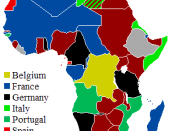Scramble for Africa, a phrase used to describe the frenzied claiming of African territory by half a dozen European countries that resulted in nearly all of Africa becoming part of Europe's colonial empires. The Scramble began slowly in the 1870s, reached its peak in the late 1880s and 1890s, and tapered off over the first decade of the 20th century. Between 1885 and 1900, European powers were, at times, racing each other to stake claims in Africa. Most Africans resisted being taken over and ruled by foreigners. Thus, much of the latter part of the Scramble involved European armies using modern weapons to crush opposition and install authority over the continent's inhabitants.
Before the Europeans began the New Imperialism (this particular phase of overseas expansion has been labeled the "New Imperialism" in order to distinguish it from the "Old Colonialism" that supposedly ended in the late eighteenth century) in Africa, very little was known about the inner parts of the continent.
However, after some explorers delved deeper into the heart of Africa, the Europeans soon realized how economically important this area was, and how much they could profit from it. After the end of slavery in Africa, Europeans wanted to expand their empires for industrialization and commerce to ensure the movement of goods and services. Economic, social, and political climates in Europe created a sense of urgency among competitive nations to stake claims in and division of the "Dark Continent". To try to create some organization during the scramble, the Berlin Congress was held and European countries "sliced" up the African countries like a cake, each country got a portion of land. The main countries involved in the colonization of Africa included France, England, Portugal, Germany, Great Britain and Denmark. Great Britain was the greatest power on...


